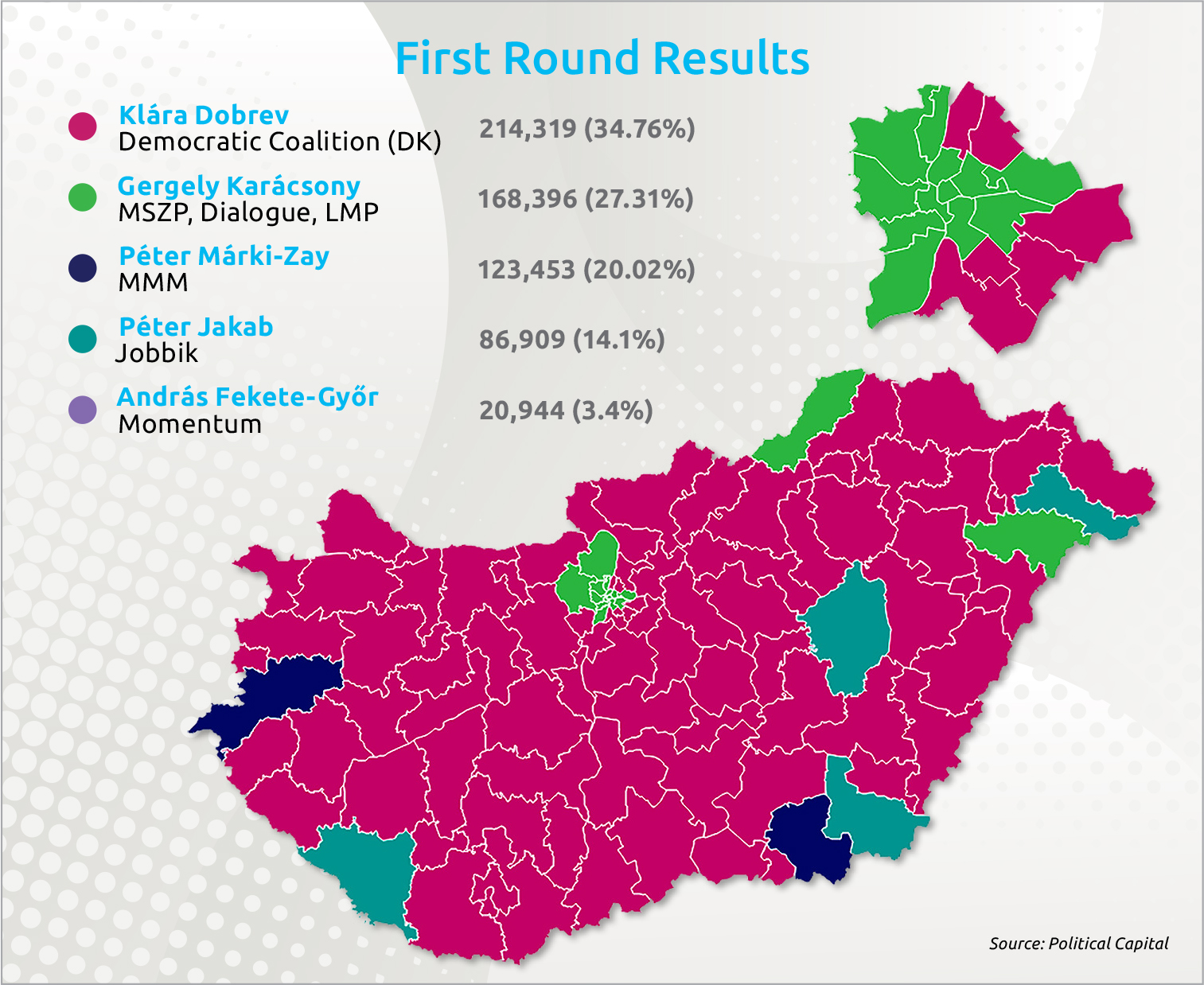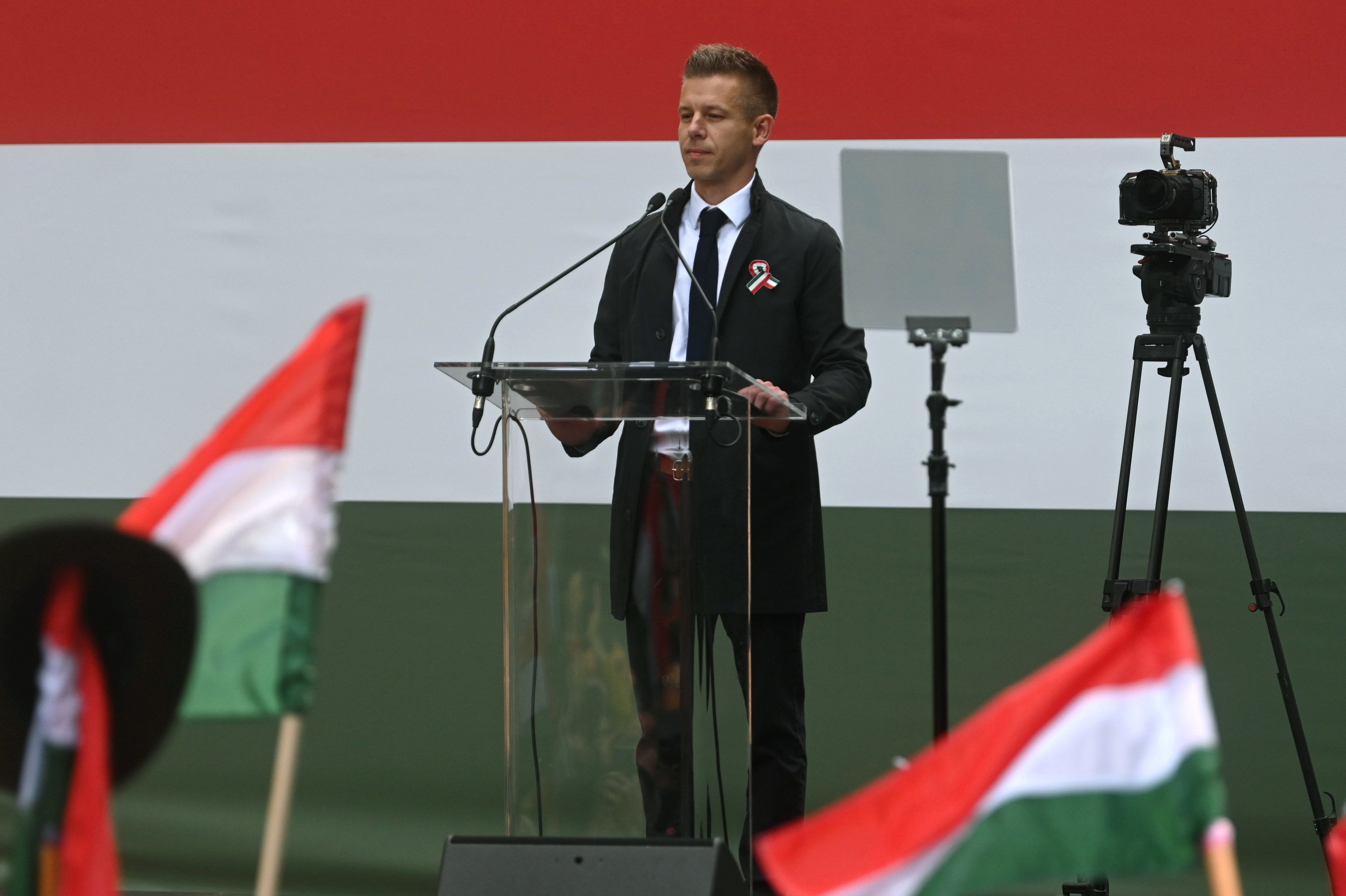Opposition Primary: Dobrev Wins Round 1, but Karácsony, Márki-Zay may run as duo in 2nd Round

MEP Klára Dobrev, along with her party, the Democratic Coalition (DK), emerged as the winners in the first round of the opposition coalition pre-elections, which took place at the end of September. However, an agreement by Gergely Karácsony (second in the vote) and Péter Márki-Zay (third) may mean one or the other is likely to end up as the opposition prime ministerial candidate next spring.
Dobrev’s determined efforts to campaign across the country this summer before the opposition coalition primaries brought their rewards as the DK MEP was the most popular choice of voters in an astonishing 85 of the country’s 106 individual constituencies, garnering 214,319 votes, or almost 35% of the total.
Karácsony, Mayor of Budapest, representing the two green parties, Dialogue and LMP, plus the Hungarian Socialist Party (MSZP), cornered second place with just over 168,000 votes, a 27% slice of the total. Márki-Zay, Mayor of Hódmezővásárhely, proved most pundits wrong, garnering more than 123,000 votes (20%) to take third place.
Márki-Zay’s result is all the more impressive given that he lacks an official party, with only his Everybody’s Hungary Movement (MMM) in direct support. However, his strong performance in the candidate debates, his well-known religious faith, and his reputation for clean and all-embracing governance of his hometown resonated with many traditional conservatives across the country.
The three most popular candidates move on to the second round of the primaries to determine the winning united opposition prime ministerial candidate for next spring’s general election. Voting will take place between October 10-16.
Péter Jakab, representing the hard-right Jobbik party, with 14%, and Momentum’s András Fekete-Győr, came fourth and fifth respectively and dropped out of the second round.
In her victory speech, Dobrev (dressed as usual in strong, bright colors) declared that “the [political] change has begun.” On paper, the results should mean she is in pole position to become the opposition’s elected nominee to do battle with Prime Minister Viktor Orbán before the country next spring.
Rarely Straightforward
However, Hungarian politics is rarely straightforward, as the current situation proves only too well. First, the Democratic Coalition’s supporters and voters are highly motivated, meaning it is questionable how many more votes can be cajoled out of the electorate in support in round two.
Second, as the governing party Fidesz never ceases to remind the public, Dobrev is the wife of former MSZP Prime Minister Ferenc Gyurcsány, a self-confessed “liar to the nation” who was, as the government would have it, responsible for all Hungary’s economic ills in the first decade after the millennium.
Speaking about her campaign strategy, Róbert László, election specialist with Budapest think tank Political Capital says: “Klára Dobrev is the professional, she’s the one who can govern, she’s the expert who knows how a state goes, who knows bureaucracy from the inside and who has the experience in the European Parliament.”
In addition, she has positioned herself as someone who doesn’t just want an election victory, but who also knows how to govern and handle the country should she win, he argues. “Yes, she can be a really good expert, but, unfortunately, she’s the wife of Mr. Gyurcsány, and she will be rejected by voters who are fed up with the pre-2010 world.”
This exact concern had prompted many analysts to forecast that Karácsony would emerge as the ultimate winner of the primaries, based on the premise that he would be the best compromise candidate of the expected three leading politicians from the first round. But that trio included Jobbik’s Jakab (who would be rejected by the vast majority of Budapest voters), not the democratic conservative Márki-Zay.
Within minutes of the first-round result, Márki-Zay and Karácsony began talking of an electoral alliance specifically designed to prevent a Dobrev victory in the second primary, with Márki-Zay even speaking about “pre-2010 corruption,” effectively taking up the Fidesz campaign line.
As this publication went to press, the two politicians were stating that they would run “as a joint duo” on the voting slips, although their decision on who would become the prime ministerial candidate remains open.
In addition, both are advocating a “government of technocrats” rather than politicians, essentially handing control of government to the eventual prime minister and his closest aides, should they win the general election in 2022.
Sharp Reaction
Unsurprisingly, these moves prompted a sharp reaction from the Democratic Coalition.
“If any PM candidate now declares that he wants an expert government, he is attacking a most basic parliamentary democratic statute. [...] This is unacceptable [...] because [...] he will not be restoring parliamentary democracy, but rather continuing the Orbán system,” Csaba Molnár, DK campaign manager, declared on Facebook.
Márki-Zay, apparently aware of how a rift in the opposition alliance now could damage the greater cause, has since sought to calm the waters, speaking of Dobrev as the likely foreign minister in a future Karácsony/Márki-Zay government.
György Magyar, a lawyer and chairman of the primary election committee, condemned any idea of a “duo” between Karácsony and Márki-Zay, telling the website hvg it was “against the rules” and a “mockery of the electorate.”
Dobrev and her closest supporter, meanwhile, have maintained a dignified, statesmanlike approach.
“The Democratic Coalition will, of course, not back out of the opposition alliance. For us, there this has never been an option. We believe that such a coalition is the key to the opposition’s 2022 victory. The ‘return to the pre-2010 world’ is part of Fidesz’s narrative,” Ágnes Vadai, DK vice president, told the Budapest Business Journal in an emailed answer to questions.
“At the same time, let us also be clear that whoever condemns the ‘pre-2010 world,’ also questions the values of the then existing Republic of Hungary,” Vadai cautioned.
“Ultimately, what we are interested in is the opinion of the people, and in the first round of the primary elections, they decided, by a large proportion, that they wanted to see Klára Dobrev as the opposition’s joint prime ministerial candidate.”
The three politicians will face off in a much-awaited televised debate on RTL Klub on October 13.
DK Ahead in Constituency Candidates
The Democratic Coalition also proved strongest in the selection of joint candidates for Hungary’s 106 individual constituencies, the most crucial element in Hungary’s 199-seat parliament. (The remaining 93 MPs are elected via party-list votes.)
DK secured 32 candidates, followed closely by Jobbik with 29, and the Socialists with 18. Momentum’s would-be MPs fared better than their leader in the prime ministerial race, the liberal, pro-Europe newcomers garnering 15 candidates, while Dialogue (seven) and LMP (five) means the two small green parties will also be present at next year’s general election.
This article was first published in the Budapest Business Journal print issue of October 8, 2021.
SUPPORT THE BUDAPEST BUSINESS JOURNAL
Producing journalism that is worthy of the name is a costly business. For 27 years, the publishers, editors and reporters of the Budapest Business Journal have striven to bring you business news that works, information that you can trust, that is factual, accurate and presented without fear or favor.
Newspaper organizations across the globe have struggled to find a business model that allows them to continue to excel, without compromising their ability to perform. Most recently, some have experimented with the idea of involving their most important stakeholders, their readers.
We would like to offer that same opportunity to our readers. We would like to invite you to help us deliver the quality business journalism you require. Hit our Support the BBJ button and you can choose the how much and how often you send us your contributions.









